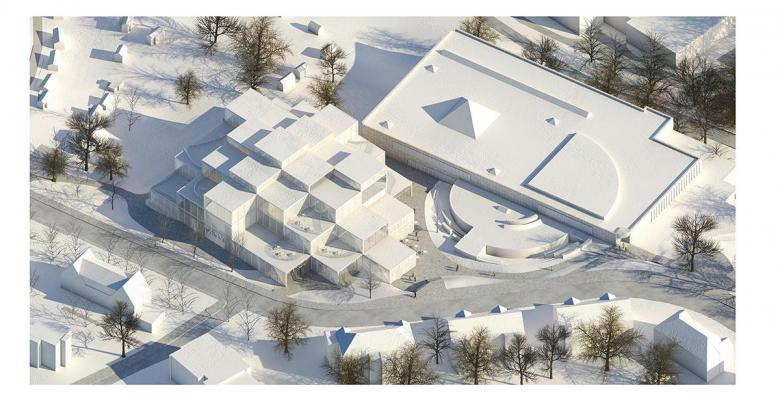A Learning Center for the HSG Foundation
Sou Fujimoto Architects has won an invited competition to design the HSG Learning Center on the Rosenberg estate for the University of St.Gallen.
Architectural, didactic, financial and urban-planning aspects swayed the sixteen-person jury to select Fujimoto's "Open Grid – Choices of Tomorrow" project. The didactic concept is already well established; according to a press release, "The goal of the project is to help the HSG and its students face the challenges of digitalisation and to enable a new quality of learning." How this quality is designed, though, is not explained.
The winning project has a floor area of around 7,000 m2 (75,000 sf) and consists of several cubes arranged on a grid. The large areas of glass and white, paper-like envelope are a signature of Japanese architecture. One could draw parallels to SANAA's Rolex Learning Center at the EPFL, for instance, which may have served as a source of inspiration for the project. After all, the HSG Foundation launched the architectural competition around the idea of transparency.
The "open grid" of Sou Fujimoto also seeks to deal with the campus of the HSG through alignment and the terracing of its boxes, with heights of 3.5 to 18.5 meters. Thus it addresses the campus's Brutalist main building by Walter M. Förderer, Rolf Georg Otto and Hans Zwimpfer from the 1960s, as well as the library and continuing education center designed by Bruno Gerosa a few decades later.
The seven other participating firms in the competition:
- Grafton Architects, Dublin
- Anne Lacaton & Jean Philippe Vassal Architectes, Paris
- Marcel Meili + Markus Peter Architekten, Zürich
- Christ & Gantenbein, Basel
- EM2N Architekten, Zürich
- Made in, Genf/Zürich
- Barao-Hutter GmbH, St.Gallen
Related articles
-
-
Jack C. Taylor Visitor Center at the Missouri Botanical Garden
Ayers Saint Gross | 09.12.2024 -
Children’s Art Laboratory St. Pölten
Schenker Salvi Weber Architekten | 25.11.2024 -
-

